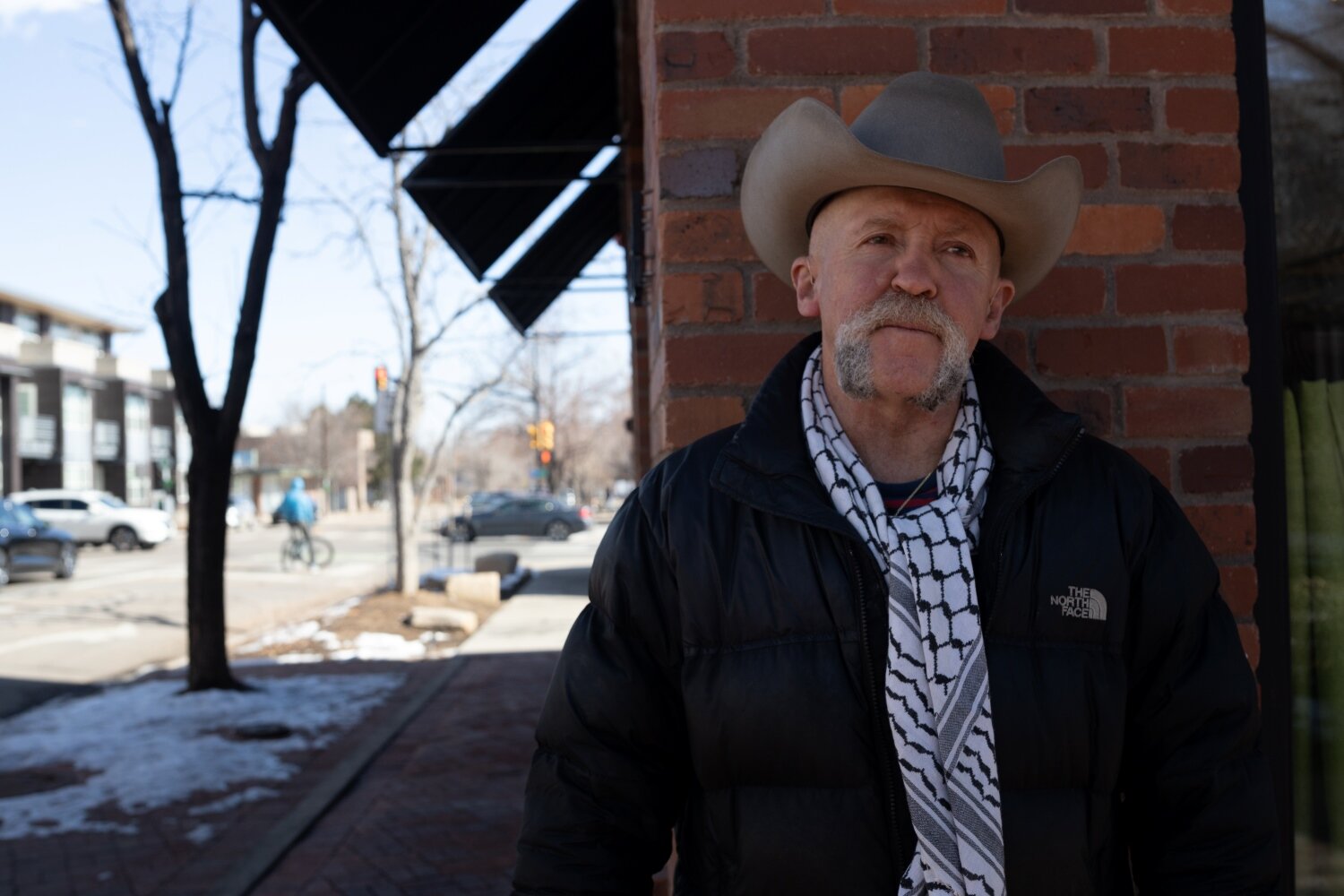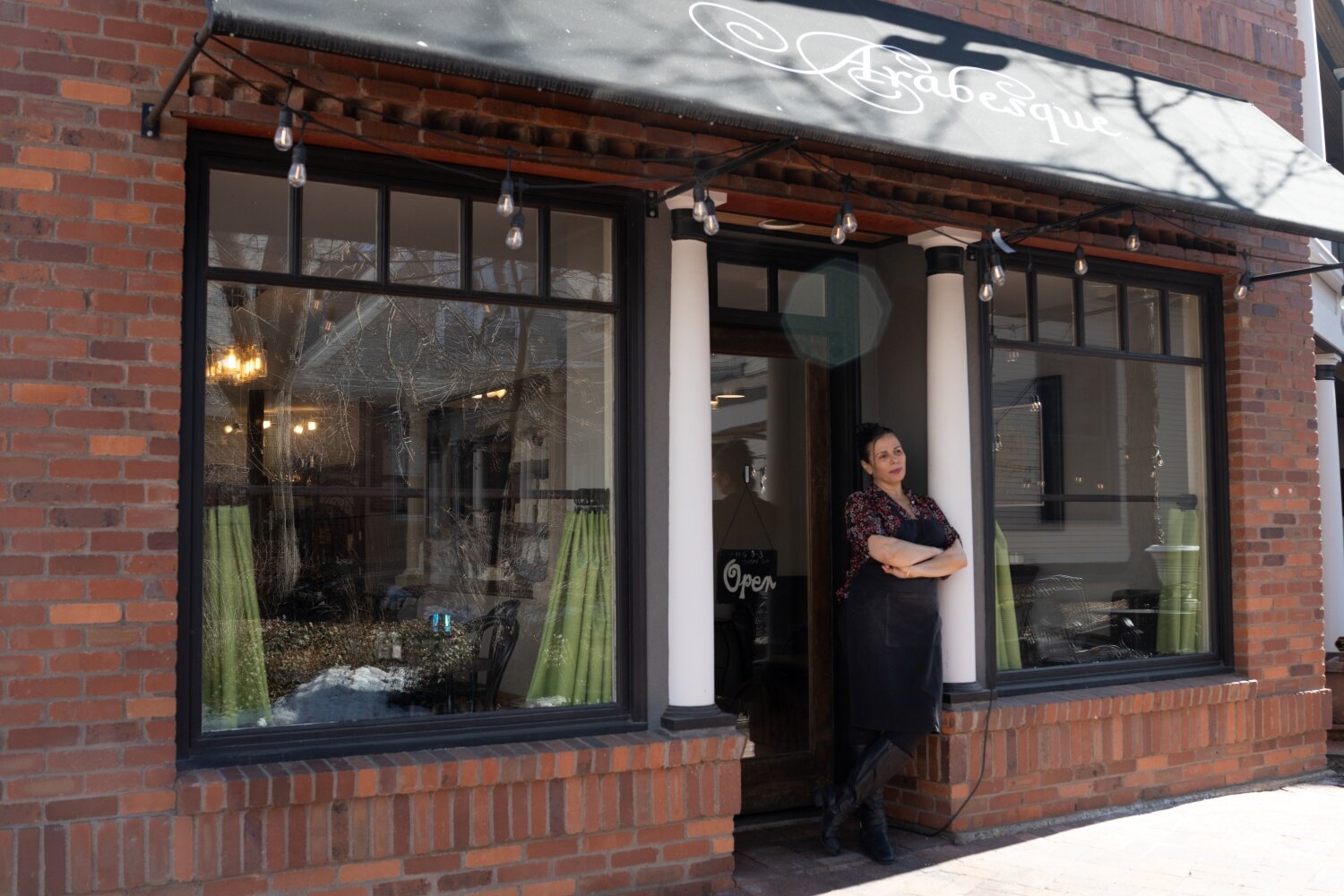In their own words: Palestinians in Colorado cope with the Israel-Hamas war

Ahmad Abu Safieh and Riham Abuhaiba found out they were having their first baby 10 days before the Israel-Hamas war began October 7 — but they haven’t had a moment to rejoice. Their immediate families remain in the Gaza strip, struggling daily to find food and water. Both have lost their family homes and all the memories inside.
Abduallah Elagha’s 18 and 20-year-old cousins were detained by the Israeli army in early February. They are American citizens from Chicago, but Elagha hasn’t been able to get information from the State Department on their status.
Sa’eb Jarrar watches Al Jazeera and Israeli news outlets. As an Arab Israeli of Palestinian descent, he tries to understand the heartbreak and human toll on both sides of the war.
These are some of the stories of the 1,500 Palestinians living in Colorado. Approximately 175,000 Palestinians live in the U.S., according to the U.S. Census Bureau, though the Arab American Institute says the true numbers are significantly higher.
This year has marked the deadliest round of violence in the history of the Israeli-Palestinian conflict. Since the Israel-Hamas war began, more than 30,000 Palestinians in the Gaza Strip have been killed, according to the latest figures from Gaza’s health ministry. Another 69,000 have been injured.
As part of Rocky Mountain PBS efforts to shed light on the Coloradans impacted by the Israel-Hamas war, we interviewed several Palestinians about their connections to the region, their views on the war and their hopes for the future. The following interviews have been edited for length and clarity.
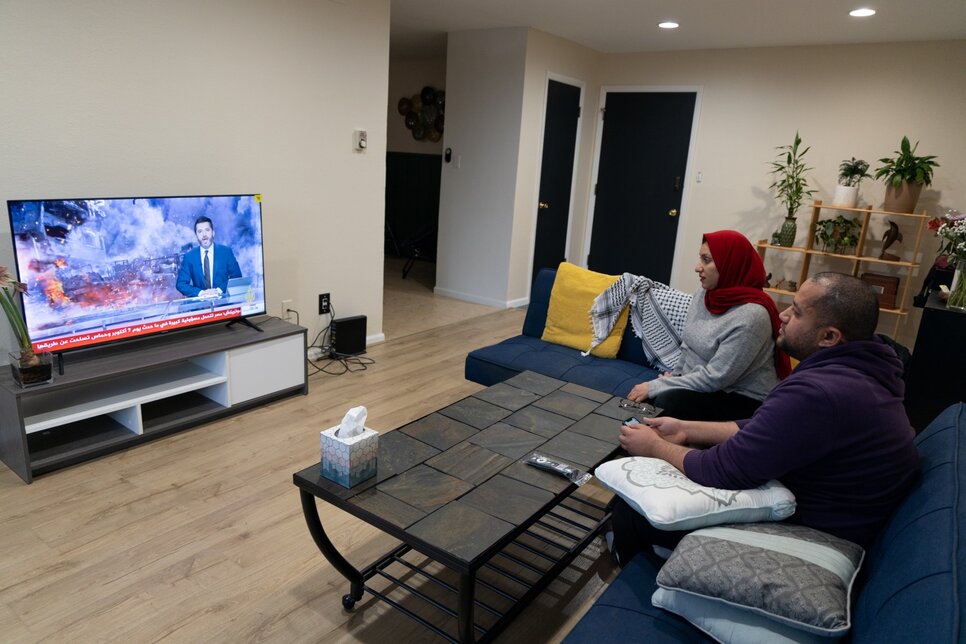
Rocky Mountain PBS: You showed me a few photos and videos of your family’s home — all in rubble. What do you know about where your family is now and how they’re faring?
Ahmad Abu Safieh: A few days ago, I found out my family’s house in the Al Aamodi neighborhood [in the north of the Gaza strip] was destroyed. We started building this house six years ago. It’s by the beach and took us around three to four years to build. I was working here in the U.S. and sending money every month.
They moved there almost two years ago, and it went just like that. We don't know when it happened, but now we know it's completely destroyed.
It's not about the furniture or things like that. It's about the memories. Everyone did everything we could to build the house. My nephew was born in this house. My sister, who graduated from the Islamic University of Gaza last year, had her graduation party in this house. My other three sisters, every weekend they’d come with their kids and spend the weekend there. When my brother told my mom we lost the house, she cried for, like, two or three days. So I told her, okay, we lost everything, but at least we are still alive. We will rebuild everything again, even from scratch. But at least you all are still alive.
RMPBS: Are you still sending money to your family? Are you even able to continue sending money there?
Ahmad Abu Safieh: At least every month I used to send like $300 to my family. In America it’s nothing, but $300 in Gaza is a whole month’s salary for an employee. And this is what I did the last five years — I supported my whole family financially. I paid for one brother’s university, another brother’s Master’s degree. I paid for one of their weddings when they got married. Because back there, there is nothing.
Now since the war started, I have to work more and more for two reasons: Just to keep my brain busy so I don’t get overwhelmed in thought — and to make more money because I need to support my family more.
Instead of being responsible for like ten people, now we [me and Riham] are responsible for, like, almost 200 people.
And during the last four months, all of it just went for food so they can survive everyday. They spend their whole days just walking from school to shelter for food. We see the news, we see how bad things are — and this is the least we can do. So instead of working like six to eight hours a day, some days, I work like 12 to 14 hours a day. Already we used all our savings that we had been saving up for our upcoming baby and the new house.
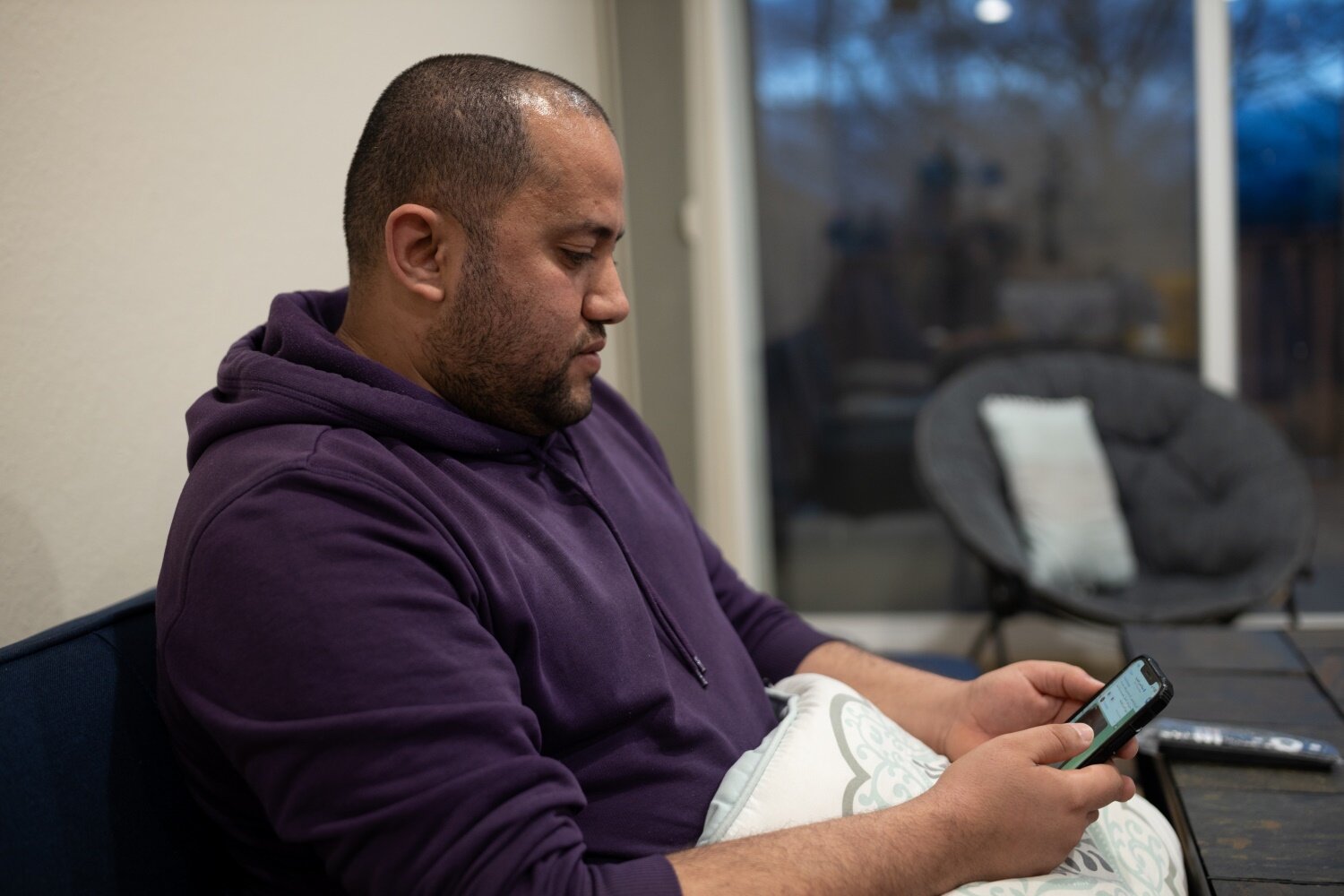
RMPBS: How do you stay in touch with your family? How often are you able to hear from them?
Ahmad Abu Safieh: Communication is really bad. We barely can get calls out and even if you get a connection, you barely can hear them. If I am lucky and I get a call, most of time, it's like 20 seconds. Sometimes you just hear the voice like “Oh, hi,” and then it's cut. And it takes like, forever to reach anyone, like literally I have to call like, 10 times.
You just keep dialing — dial, dial, dial. We spend hours just trying to call each one of our family members. My phone is on all the time, like 24/7 because you don't know when you will get a call or a message. I keep my phone next to my head, even when I am sleeping. Because if there is any notification or message or anything, I need to know.
Every day I check the hospitals for the names of the people who were killed to see if I know any of the people. I’ve seen many of my friends names on that list. One of my cousins, this is how I find out he was killed. I just saw his name on the list. So this is how it works now. Like we just need any information. Sometimes, I just open WhatsApp and see when the last time anyone I know was online. So if I see my sister was online like three hours ago, at least I know she somehow got connection and her phone is on. So hopefully she is still alive.
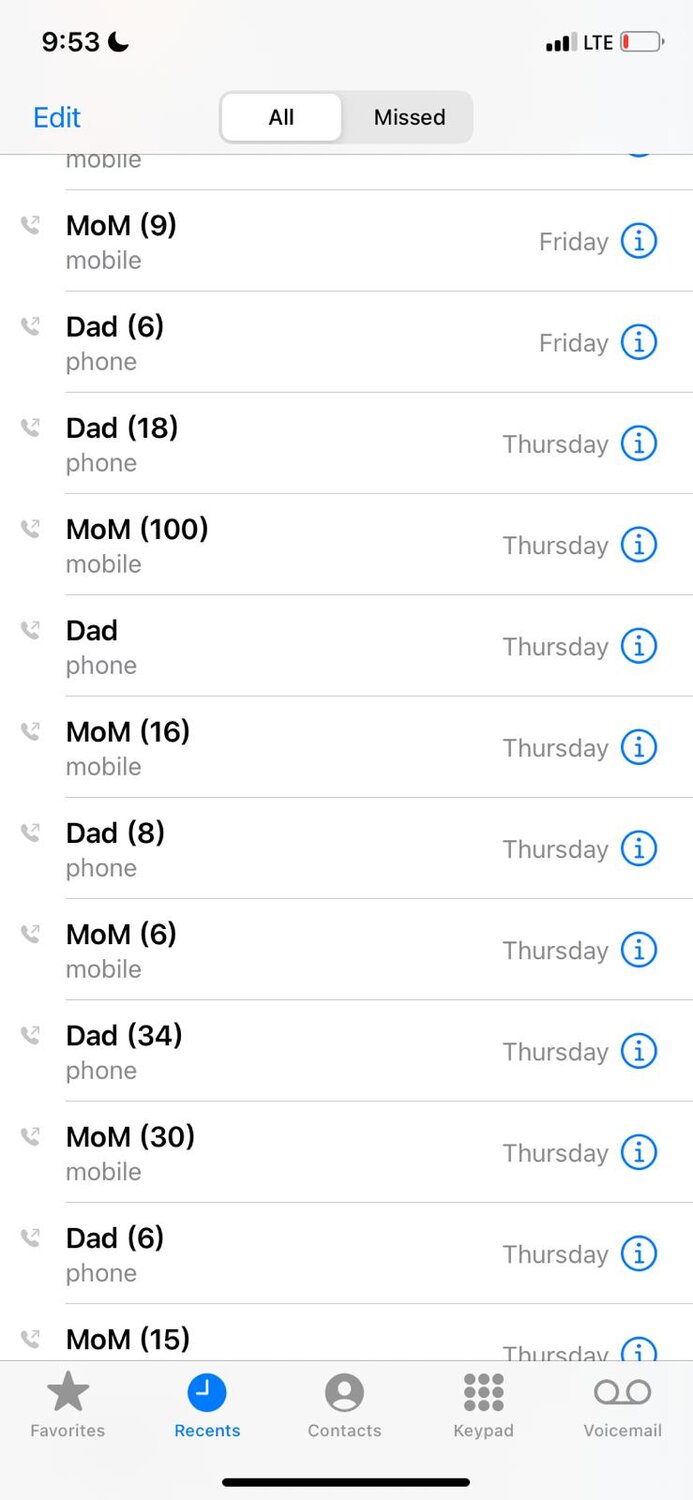
Ahmad and his wife have had a difficult time getting hold of their parents, but they keep trying. In this screenshot, Ahmed’s wife Riham frantically tried to call her parents one evening after she heard they had to flee a UNRWA school and heard reports of several dead bodies on the road nearby.
RMPBS: How has the uncertainty around your family's safety affected the life you're building here in Colorado?
Ahmad Abu Safieh: You know, like, when you feel like your life is finally getting settled? This summer, we got to the point where we finally felt settled. My business has been very successful. Riham got promoted at her job, she finished business school. So we said, okay, lets start a family.
We bought this condo in September and we moved in October 2nd, five days before the war started. We found out Riham was pregnant with our first baby September 28, 10 days before the war started. It was a really beautiful moment. But since then, we haven’t even gotten the chance to process it or get excited about our first baby.
RMPBS: How would you compare this war to previous conflicts you’ve experienced in the past?
Ahmad Abu Safieh: It's been hard all of my life. It's not just these last four months. I lived through all the wars before, like 2008, 2012, 2014, but everything before was like nothing compared to this. I don't think there is any language in the world to describe how bad things are at this time. In the wars before, the Israelis used to attack one place or one house. But this time, they’ve destroyed, like, whole neighborhoods.
Almost all of the Gaza Strip is now destroyed. The Israelis destroyed it all. You want to destroy Hamas? This goal doesn't make any sense. In 10 years you will face another Hamas again — maybe with the same name or a different name. But with all these people who have lost their families, you think in 10 or 15 years they will be open to peace?
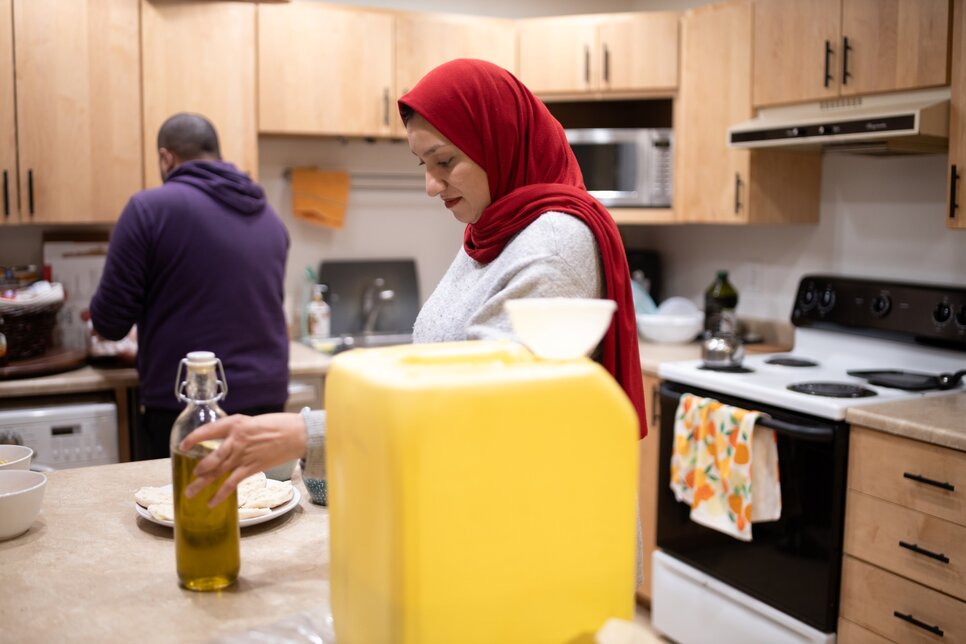
Riham Abuhaiba prepares bread with za’atar and Palestinian olive oil in her and her husband’s new condo in Boulder.
Photo: Andrea Kramar, Rocky Mountain PBS
RMPBS: Have you had much contact with your family? How are they doing?
Riham Abuhaiba: Half of my parent's home [in Khan Yunis, in the southern Gaza strip] now is destroyed. This is the home I grew up in. I remember how hard my parents worked building it room by room. It was my grandparents home first, just one small room. And then when my dad got married, he built another room. And then when they started having kids, they built the second floor. So it was built piece by piece. And I remember how my mom worked so hard just to buy furniture and decorations for the home. And now all of it is gone. Most of the people in Gaza are not rich. They spend all their lives just to build their home. It’s what they are dreaming of all their life. And now my parents, they live in a tent.
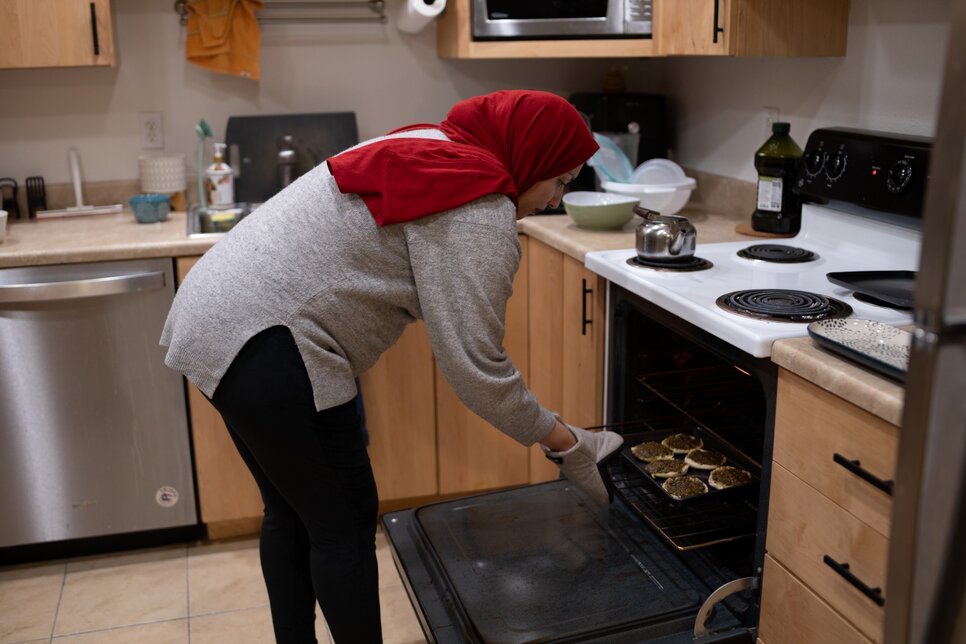
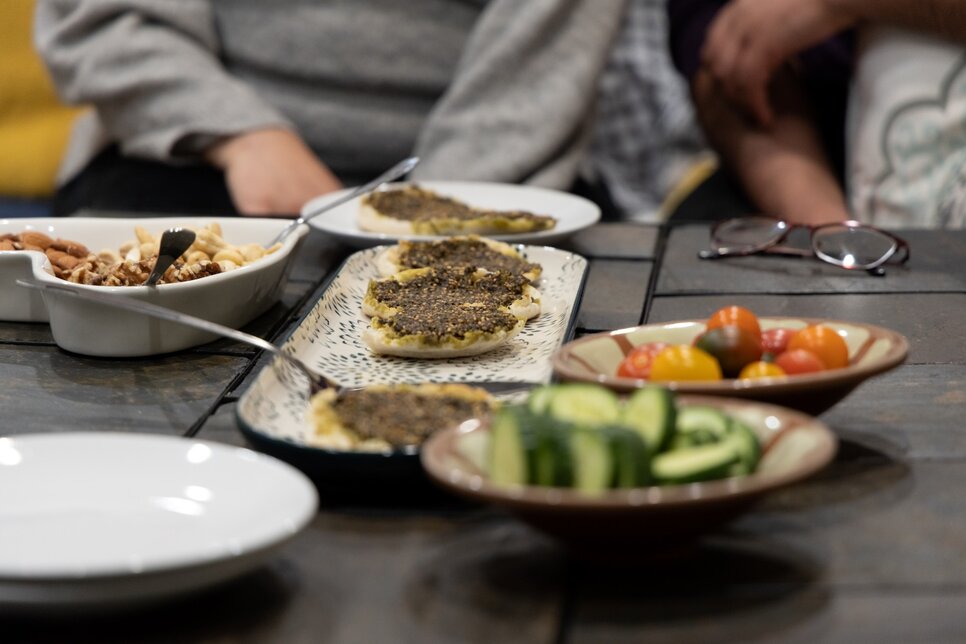
RMPBS: It must be hard for you and Ahmad to talk about what your families are going through — to have to keep re-living the trauma.
Riham Abuhaiba: Ahmad and I, we cannot be happy or laugh or have a good life. We have been like this for four months.
We used to talk with my parents at least once a week through video call. Every single thing I do, I love to call my parents and share what's happened with me. Right now, this should be the happiest moment for me. Over these past four months I went through so many things [a job promotion, a new home, a pregnancy], but I couldn't be happy. Like now with the pregnancy, I cannot really be happy because I cannot share it with them [my family].
Still, sometimes when I do something, I text my mom. I know she will not see it, but I think maybe after the war, she will see it once she gets internet connection. So I keep texting. And sometimes I feel like a crazy person. But I want to make sure she knows that on that day and that time, this is what happened and how I was feeling.
Sa’eb Jarrar, (65), is a Palestinian born and raised in Acre, Israel and has Israeli citizenship. Individuals like him are commonly referred to as Israeli Arabs. He moved to the U.S. in 1985 for better job opportunities. His relatives remain in Israel and the West Bank. Currently Jarrar helps his wife Manal Jarrar run her middle-eastern restaurant, Arabesque, in Boulder.
“I love the country. I mean the country as a geography, not as a political entity. I love my hometown. I love the history, I love the heritage,” said Sa’eb Jarrar, a Palestinian who grew up in Israel.
Photo: Andrea Kramar, Rocky Mountain PBS
RMPBS: What was it like for you growing up as a Palestinian living in Israel?
Sa’eb Jarrar: Israel is unfortunately a very racist society. It starts on the Jewish side and then it spreads to the Arab side. There is so much ranking within the society, and there is ranking of the Arabs. Arabs in general are definitely third or fourth class citizens. You just feel it and live it in everyday interaction. And then when you’re growing up in times of tension, like war, the friction is even higher, the tension is higher.
RMBPS: Do you feel like Arabs in Israel will ever be treated as equals?
Sa’eb Jarrar: Nothing is a nonstarter. You have to believe that there is hope. Unfortunately, the trend is backward. Bezalel Smotrich [Israel’s far-right finance minister] and Itamar Ben-Gvir [Israel’s far-right national security minister] what they're doing is taking Israel backward and obviously it spills over to treatment of the Arabs. I definitely don't see it happening anytime soon.
RMPBS: It must be hard for your family right now to witness so closely everything that’s going on.
Sa’eb Jarrar: I think it should be hard for anybody in the world to witness what's happening there. But what really is the hardest currently with my family and friends is the oppression that is going on in Israel against Arab citizens. Any post, anything that is hinting — not even directly — at supporting or identifying with people in Gaza is punished. People are losing their jobs. It’s never been like this, so this is a particularly bad time.
Since the war started, because I believe the coverage here in the U.S. is screwed up, I said I'm not going to watch TV here. So I get my information about what's going on from Al-Jazeera in Arabic. If you watch that, you really can go crazy. But with what you see, that's the reality. And since I know Hebrew, I also watch the Israeli TV channels. I want to make sure that I watch the personal stories of the people that were killed on October 7 and the families of the hostages, so that we don't just talk about people as numbers, but really know them personally. It's absolutely devastating. I hear so many stories on both sides. It's not numbers for me.
Hopefully the killing will stop and we'll have a cease-fire, and maybe, even though it looks remote now, start talking about peace, I hope, because this cannot continue. This is just too ridiculous.
Manal Jarrar was born and raised in Acre, Israel. Like her husband Sa’eb (above), she is a Palestinian born and raised in Israel. She was a professional ballet dancer and instructor, teaching both Jews and Arabs in Israel. She moved to the U.S. in 1988. In 2009, she opened Arabesque, a small middle-eastern restaurant, in Boulder, where she cooks, connects with her customers and — on occasion — dances. She and her husband Sa’eb have three children.
RMPBS: How do you feel being here in the U.S. at this time, knowing what is happening in Gaza?
Manal Jarrar: I'm cooking here and I'm feeding people and I'm so happy with that. But at the same time they [Palestinians] are my people and they’re over there starving. To keep doing what I'm doing, the way I cook, it's like one little truth among millions of lies.
I would like to be there in a heartbeat but then what next? I can’t. What do you want me to contribute? This is not about: “Oh I'm going to help people. I'm going to feed the hungry.” It’s not about that. This is like the Crusades all over again. People never look at each other and think: Why are we doing this? Why are we coming and taking your home and land and starving you and killing your babies and children? Why are we raping your women? Why are we doing that? We never question it. Why are we killing Israeli soldiers? They have feelings, they have a mom, they have a dad. It’s because sometimes people are minions. They need a leader, they need to follow authority to tell them what to do, where to go.
RMPBS: Most people see that one is either Israeli or they are Palestinian — but you are both. Do you feel like you have a different perspective than most people, or a different understanding of both cultures?
Manal Jarrar: It's harder. You know the game with the two ropes? It’s the feeling of jumping two ropes. You need to balance between feeling as a Palestinian and also keeping your relationship with the Jewish people. If you slip one time when you have two ropes, you’re over. But when you have one rope, you can stop, you can play, it’s easier. You have both hands.
If I had grown up in Jenin in the West Bank or Gaza — I’d have one rope, I’d have one faith, one hope, one belief. That’s it. But it’s a little bit harder as an Arab Israeli. Because you always have to make sure to balance between the two ropes. And I didn't like it because you always have to pretend. You always have to play the game. Is it truth? I don’t think so. You always have to be nice, even if the Israelis do something that you don’t t like. There’s a lot of pretending, there’s a lot of acting, there’s a lot of “we make peace.”
Reema Wahdan-Alaswad is director of the Colorado Palestine Club, co-president of the Al-Bireh Society and a fundraiser for the Palestine Children’s Relief Fund, among other humanitarian organizations. Her parents are originally from the West Bank, and immigrated to the U.S. in the 1970s seeking to achieve the American dream. Her aunt still lives in the West Bank. When she’s not involved in advocacy and humanitarian work for Palestinians, she works as a breast cancer researcher at University of Colorado’s Anschutz Medical Campus.
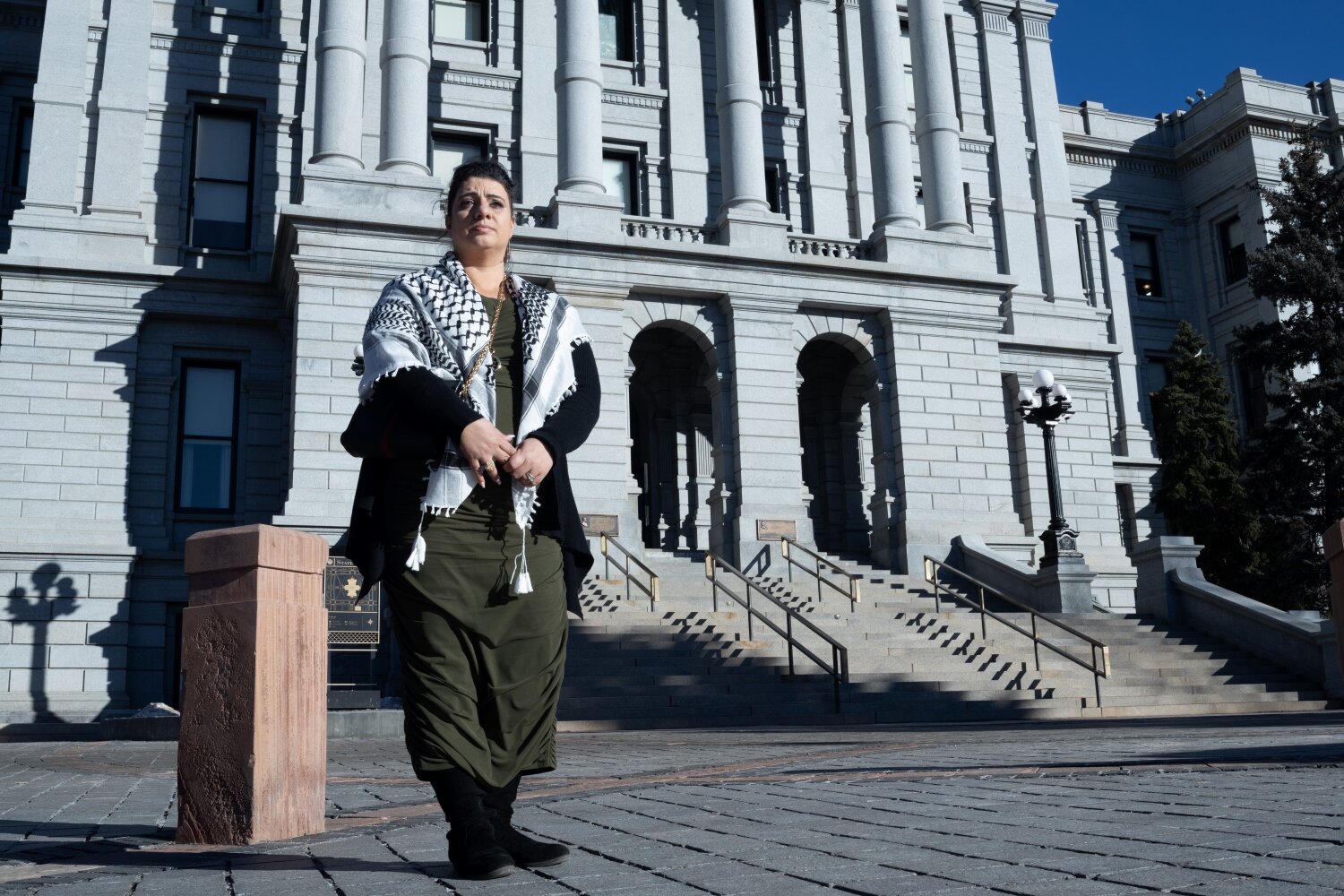
“What we're trying to do is work with our elected officials to recognize that a ceasefire is the bare minimum that needs to be done to be able to halt this ongoing cycling of death,” said Reema Wahdan-Alaswad, a community organizer and Palestinian advocate in Colorado.
Photo: Andrea Kramar, Rocky Mountain PBS
RMPBS: I can’t imagine how busy you are these days — between your job and organizing on behalf of Palestinians. Your organization seems to support so many events each week.
Reema Wahdan-Alaswad: We don't sleep. I mean, I can't see these images and not speak on their [Palestinians’] behalf.
They cannot speak. I will not be silenced and support our government in this brutal campaign against the Palestinian people. So all activists are working through the night hours, zoom calls until like two in the morning many days. But you know, we have to do what we have to do.
We don’t want to have this other failed foreign policy like what happened in Afghanistan, to only come back and say, we failed in Palestine. We know our policies are failing. We will not bend backwards to allow our [U.S.] government to be complicit in these crimes. And so we are just going to keep on working.
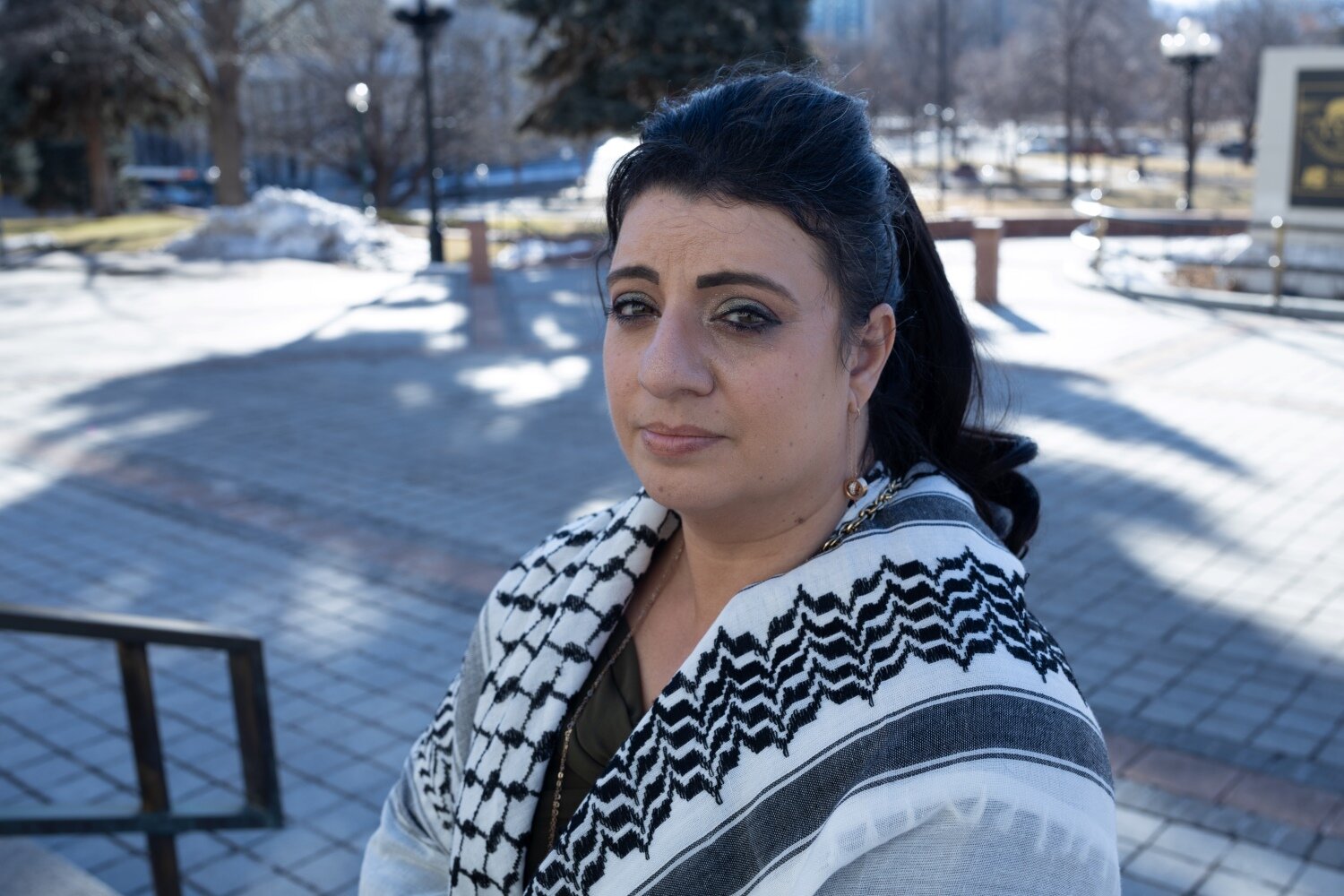
RMPBS: Your family’s middle eastern restaurant in Greenwood Village was harassed in early October. Can you give some details on that?
Reema Wahdan-Alaswad: Someone called with a death threat. We always get them. In the '80s and '90s, whenever there was a war in the Middle East, we would always get them, but this call was a little bit different because two days later, our family’s home was shot at.
RMPBS: What are some of the things you and members of your community are advocating for?
Reema Wahdan-Alaswad: The Palestinian community has for the first time been able to meet with our state representatives, which is unbelievable that it's taken them decades to even open their doors to our community. On the legislative front, what we've been asking for is a very simple ask: To support a ceasefire resolution at the bare minimum. That's what our government needs to support to stop this onslaught and this killing campaign against the Palestinians living in Gaza and in the West Bank.
Abdullah Elagha is a Palestinian who was born in Libya and immigrated to the Chicago with his parents as a young child. Many of his extended family members are in Gaza. He lives in Denver and is an organizer with the Colorado Palestine Coalition.
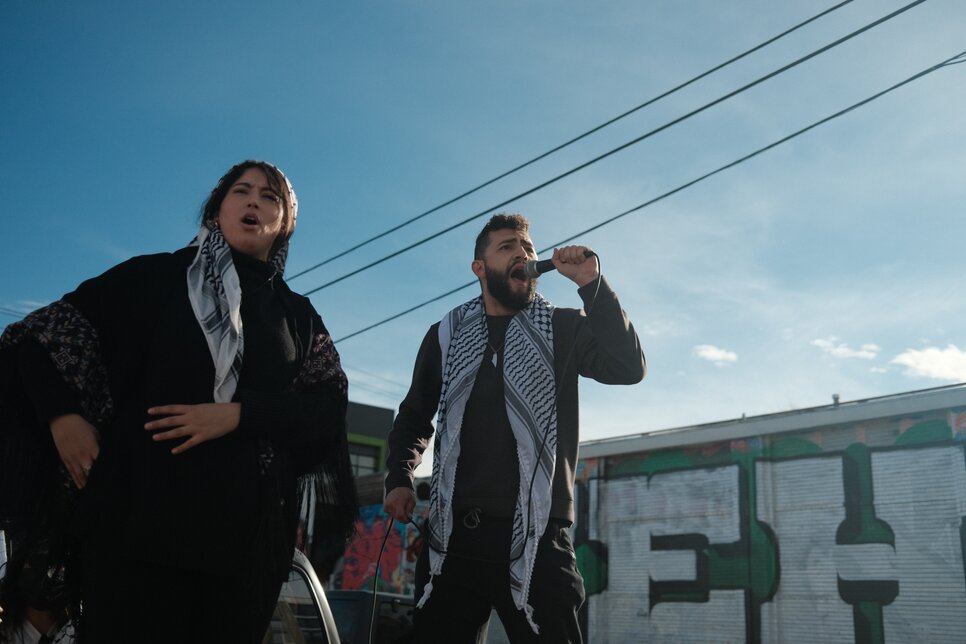
RMPBS: You’ve been in the news lately because so many in your extended family have been killed. Tell us about your family in Gaza and what you’ve been hearing on the ground.
Abdullah Elagha: My family is pretty connected with each other. I know here in America when people have the same last name, it's not always very likely that they're related. But in Palestine if you have the same last name, you're related. Obviously I don't know my exact relation to all of them, but we have a family tree.
Everyone just tries to stay in touch with whoever they can stay in touch with. Israel completely cuts off communication very regularly. So it's hard to hear back from people and keep in touch. That's why things like our family website and our family Instagram page have been such a godsend because, I mean, it's unfortunate, but it’s the only way that we can know if people are alive or dead.
120 of my relatives have been killed since this war started. There are three entire families of my relatives that have been erased from the civil registry — children, parents, grandchildren — all gone.
I don't really understand exactly what Netanyahu means when he says that he will accept nothing more than ‘total victory.’ What constitutes total victory? Is it just completely flattening the entire region? Is it murdering each and every single person left standing? Is that what a total victory is? Because that's what it seems like.
And then on the flip side, our elected officials here in the U.S. won't even say the word “ceasefire.” It would be absurd to not advocate for a ceasefire regardless of which side of the issue you're on.
The people who I'm closest to who are there right now are my second cousins Borak, who’s 18 years old and Hashem, who’s 20 years old. They're actually American citizens from Chicago.
Recently, around 5am Gaza time, while my second cousins and their family were sheltering in Al Mawasi in the south of the Gaza strip, Israeli soldiers raided the shelter they were staying in, blindfolded and tied all of the women and children, took them outside, trashed the shelter and took their electronics.
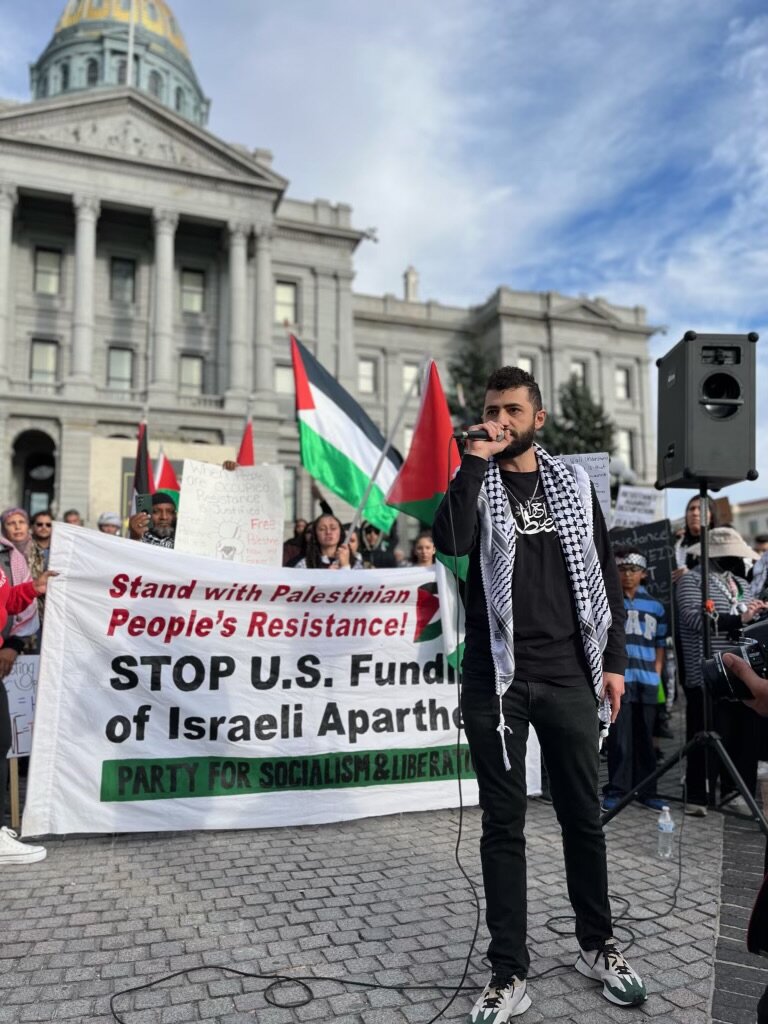
Photo courtesy of Malek S’fair
And then they kidnapped all of the men who were of military age, so basically anyone above 18 and younger than 70. This included Borak and Hashem, their father and their uncle Nayan — who suffers from extreme schizophrenia and is unable to care for himself. In total, they abducted 20 men from my family that night. Those four are just the ones who are the closest in relation to me.
We don't know what's going to happen to them. We don't know if we're even going to see them again. This is not unique right now in Gaza. The IDF is systemically rounding up Palestinian men and making a very open show of it.
It’s just absolutely absurd that the U.S. sends Israel billions and billions of dollars every year and we can't even ask them why they're detaining Americans in Gaza. These are two American citizens who were kidnapped by Israeli forces and we can't even get information about it.
RMPBS: Before this war broke out, did you or your family or friends in Palestine think peace was a possibility?
Abdullah Elagha: I don't really think peace is accurate when describing what is needed in the region. I think what is needed is justice. I think what is needed is liberation for people who are occupied, for people who are suffering under the Israeli brutality that they have been experiencing for decades now. So I don't really think peace can exist without justice.
When we say we want a ‘free Palestine,’ we don't mean that we want an Arab-Muslim ethno- state where only Palestinian Muslims have rights and other minority groups have different rights. When we say that, we mean a place where everybody is free, where nobody has power over another because of their racial identity or their ethnicity.
Andrea Kramar is the investigative multimedia journalist at Rocky Mountain PBS. Andreakramar@rmpbs.org
